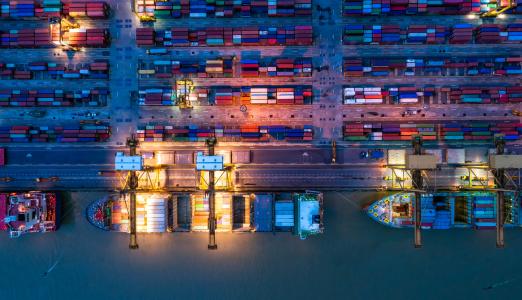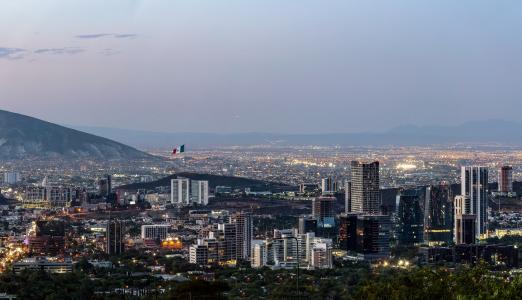'Unlocking the Bottlenecks in Africa's Ports'
Ports around the globe are planning expansions to respond to the growth and changing patterns (such as vessel size) of containerised maritime trade and to the development needs of their hinterland economies. Global trade is on the rise again, driven by growth in the emerging economies. Inadequate container port infrastructure can be a severe logistics bottleneck and a constraint on growth. Efficiency and capacity need to increase in step with demand. At the same time, port policy makers and terminal operators have to match capacity to demand carefully to avoid costly over investment, a task complicated by rapid technological change in shipping markets with the introduction of larger vessels, fluctuating fuel prices and restructuring through mergers and alliances.
Large-scale port projects have irreversible effects on land use and multiple impacts on the local economy and local community. They affect the way that the regional and national economy operates as a whole, not just in the vicinity of the port, with major impacts on regional transport systems. Port planners make better decisions when these broad impacts are examined as part of the development of a national freight transport and logistics strategy. Private investment in port terminals is also facilitated by the certainty engendered by these strategies. Decisions to invest in new container ports need, in particular, to take careful account of forecasts of hinterland demand for containerized trade, the broader context of evolving maritime transport markets, competition between ports, the development of port hinterland transport infrastructure, community attitudes towards port traffic and environmental issues.
A well-developed transport infrastructure is critical for the efficient functioning of an economy. It facilitates trade by reducing the cost and time of moving goods to where there is a market for it; it also makes it possible for people to travel, or to move to regions where there are jobs available. Good transport infrastructure and services have a massive impact on productivity and economic development. The lack of good transport infrastructure is, however, a key constraint to economic development in Africa.
In order for Africa to fully achieve its economic growth potential, a significant improvement in the quality and scale of its infrastructure is required. The need to upgrade and expand infrastructure does, however, represent a significant opportunity for international investors looking to develop and finance infrastructure in Africa and share in the benefits this can bring. There are several projects in the pipeline, with the involvement of both government and private sector. For investors and developers willing to take on risk, these offer potentially lucrative investment opportunities.
Pre-Conference
7 October 2015
19.00 Icebreaker Drinks Reception at the Crowne Plaza
Delegates are invited to join us for an informal drink to get to know each other and start their discussions early!
Agenda Day 1
8 October 2015
08:30 Registration & Welcome Tea/Coffee
09:30 Opening Notes from Conference Chair
Steven Boukaert, Director, MTBS
09:40 Keynote Welcome Address
Gert-Jan Nieuwenhuizen, Managing Director, Port of Amsterdam International
10:10 Welcome Address - The Rise of Africa and the Business Opportunities this Presents
Rene van Hell, Director International Enterprise, Ministry of Foreign Affairs, Netherlands
Session 1: Africa’s Maritime Infrastructure and Industrial Acceleration
10:40 Keynote Address: Developing a Global Supply Chain Ecosystem - A Walvis Bay Perspective
Johny M. Smith, Chief Executive Officer, Walvis Bay
11:10Tea/Coffee Break
11:30 Keynote Address: Developing and Implementing a Port Master Plan to Support Growth
Omar Suleiman, Former Managing Director, Nigerian Ports Authority
12:00 Infrastructure Investment to Drive Industrial, Economic and Population Growth
Francois-Xavier Delenclos, Vice President, Business Development, APMT
- Case Study: A USD1.5 billion investment in Ghana’s infrastructure by APM Terminals and its partners is unconventional in its scope, and will have a major role to play in maintaining the pace of one of the world’s fastest growing countries
12:30 Building with Nature
Bas Kolenburg, Senior Treasury Manager, Boskalis
- Sustainable port developments
- Green ports
13:00 Lunch Break
Session 2: Investment & Transaction Scenarios for Optimum Development
14:00 Investment & Transaction Scenarios for Optimum Development
Jean-Philippe Paquin, Ports & Marine Practice Leader, CPCS
14:30 How do West African Ports adapt to the Changing Patterns in Container Shipping?
Michel Donner, Senior Advisor, Drewry
- An update of fast paced African projects, linked to shipping industry evolution
15:00 The New Era of Public Private Partnerships
Frank Luisman, Director, MTBS
- Responding to a changing environment
15:30 Tea/Coffee Break
Session 3: Improving Connectivity in Africa
16:00 Developing a Single Window Trade Portal for Global Trade Facilitation
Richard Morton, Secretary General, IPCSA (International Port Community Systems Association)
16:30 Panel Discussion - How a Trade Information Portal can be a Pathway to International Trade
Moderated by: Richard Morton, Secretary General, IPCSA (International Port Community Systems Association)
Panelists include:
- Pedro García, Business Consultant, Portel Servicios Telematicos
- Yann Alix, Business Development Manager, SOGET
17:15 Summary Notes Followed by a Canal Boat Tour and Gala Dinner Hosted by MTBS
Canal Boat Tour and Gala Dinner
Hosted by MTBS
Venue: The Heineken Experience, Amsterdam
http://www.heineken.com/gb/heineken-experience/heineken-experience.aspx
Delegates will leave for the Gala Dinner venue from the nearby waterfront canal boat pick up and be taken in style to The Heineken Experience. This dinner is open to all PFI Amsterdam participants – but please ensure you have confirmed your place in advance. Please email joanne@portfinanceinternational.com if you have not yet done so.
Agenda Day 2
9 October 2015
08:30 Registration & Welcome Tea/Coffee
09:15 Opening Notes from Conference Chair
Steve Cameron, Managing Director, Cameron Maritime Resources
Session 4: Port Planning and Preparedness
09:30 Controlling Risk and Insurance in African Port Projects
Andrew Webster, Partner, JLT
- Key insurance issues relating to the development of ports and terminals.
- Focus on project control, operational issues, concessions
09:55 Operational and Integrity Risk Facing African Ports
Jan Harm Kamphuisen, Director Consulting Europe and Africa Control Risks
- Case studies from Nigeria, Kenya and Mozambique
- Focus on mitigation
10:20 Environmental, Social and Governance Risk in Port Project Finance
Alec Martin, Principal Consultant - Impact Assessment and Planning, ERM
10:45 Sustainability of Large Scale Port and Marine Infrastructure
Marco Pluijm, Manager Port and Marine Infrastructure Sector, Bechtel Corporation
- Seen from a practical point of view – with examples from Europe and the US
11:10 Tea/Coffee Break
11:40 Africa: A New Port of Call for International Operators
Joss Dare, Managing Partner, Ashurst
12:05 Case Study Morocco: Improving Port Connectivity through a Single Window Portal for Trade Facilitation
Tarik Maaouni, Director of Organization and Information Systems, Agence Nationale des Ports (ANP)
12:30 Terminal Master Planning for Africa and New Technologies
Remmelt Thijs, Senior Project Manager, TBA (Holland)
- In the African continent port and terminal master planning should consider specific African circumstances and experiences. At the same time terminal port authorities and terminal operators should also consider to make a step towards using modern technologies and copy best practices
12.55 Overcoming Bottlenecks and Embracing Opportunities in Africa’s Ports Sector
Gunther Ginckels, Business Partner, InduStreams
- West African ports (WAFP), bottlenecks and lack of hinterland and multimodal opportunities city-locked ports - sense / nonsense of expanding these ports
- TCT (Total Cost of Transit) cost comparing ports in the West Africa region
- Competition between WAF ports or lack of it
- Options for Port development in Africa - good examples/bad examples/SWOT’s
- Where do the financiers and investors come in? CSR and sustainable development objectives
- People, planet, prosperity (or profit?)
- Opportunities through service ports for the mining industry – win/win synergies through service port commercialisation for 3rd party cargo flows
- How can mining infrastructure – ports, railways, inland facilities – add value to the logistic process – missed opportunities
- The possible impact of competition on the total logistics costs for the region
13:20 Lunch
14:30 Unlocking Port Investment Projects through PPP
Wouter van Nus, Manager, MTBS
16:00 Summary Notes followed by Tea/Coffee Break
*Certain speakers, topics, titles and content may be subject to alteration. The organiser reserves the right to make changes to the programme as necessary.
Registration is closed.
Venue:
Crowne Plaza Amsterdam City Centre, Nieuwezijds Voorburgwal 5, 1012 RC Amsterdam, the Netherlands
Accommodation:
- 195 Euros per night. (Please book as soon as possible as rooms are subject to availability)
Please click for the group-booking link and please enter the dates in the reservation box.
The special rate will only be available to book until September 15.
Visa
Please note that Port Finance International cannot assist you with applying for or obtaining visas. For information about visa requirements and application procedures please contact your local Embassy or Consulate.



